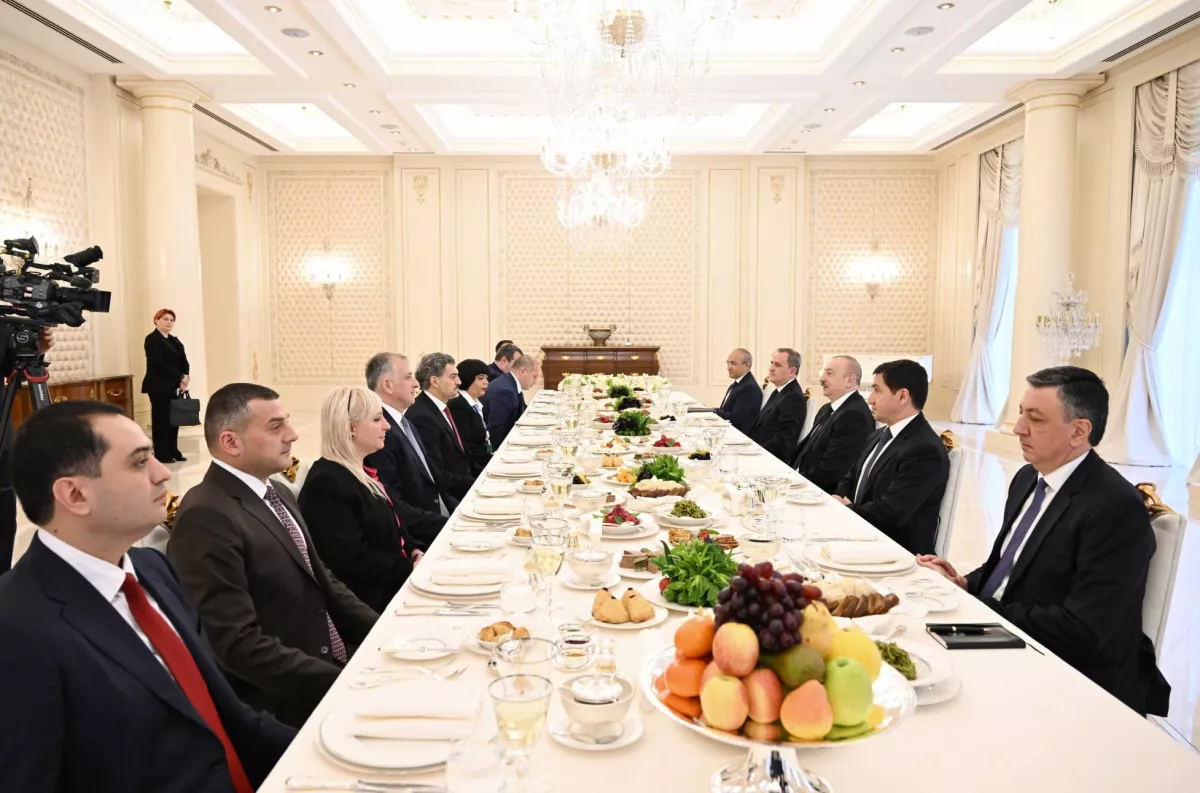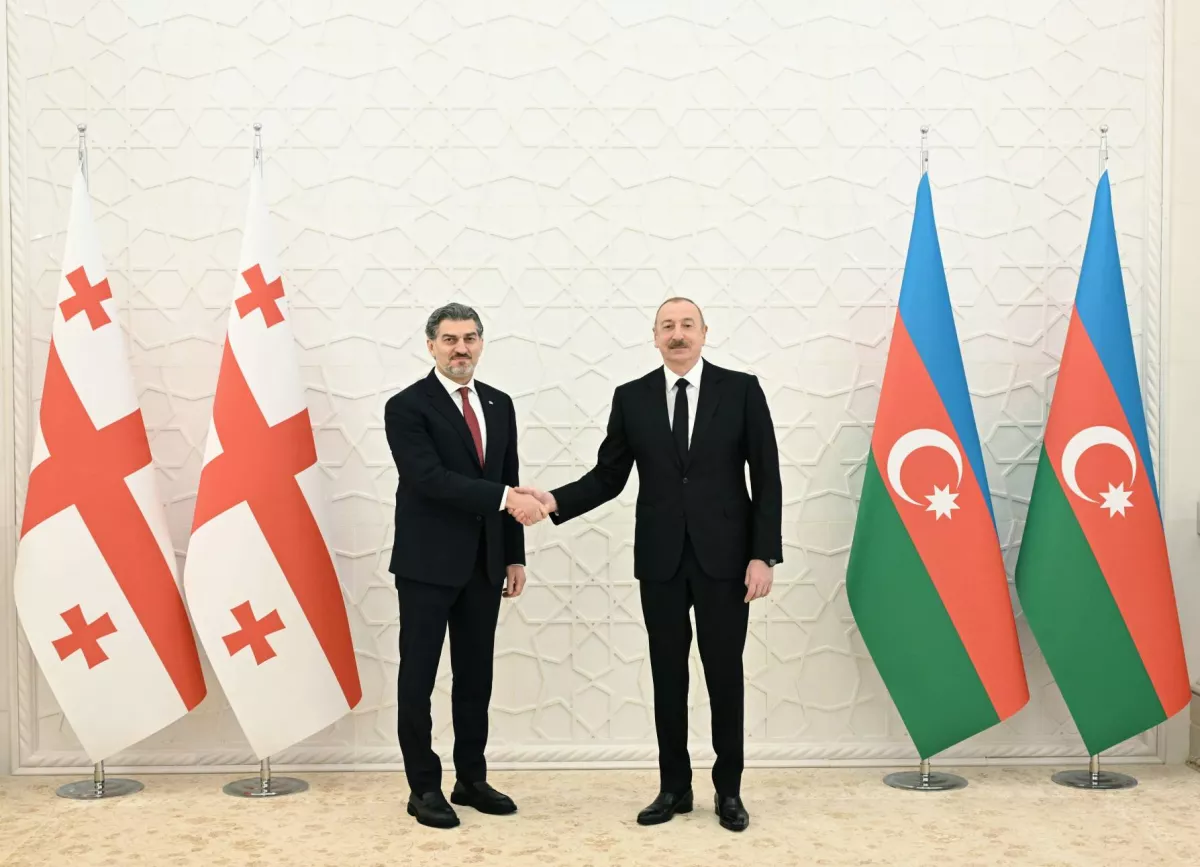Middle Corridor, energy, and sovereignty Following the Georgian president’s visit to Azerbaijan
Mikheil Kavelashvili, the newly elected President of Georgia as of late 2024, paid his first official visit to Azerbaijan on April 15–16, 2025 — a gesture that underscores the great importance of the friendship and cooperation between Baku and Tbilisi.
“This is my first foreign visit as the President of Georgia. This visit underscores the strategic and special nature of the good-neighbourly relations between Georgia and Azerbaijan. It was important for me to visit Azerbaijan shortly after my election to this office,” President Mikheil Kavelashvili of Georgia said at a joint press conference with Azerbaijani President Ilham Aliyev.
For Tbilisi, cooperation with Baku is also significant because Azerbaijan, having faced the challenges of separatism even earlier than Georgia, has successfully restored its full territorial integrity. This is something Georgia has yet to achieve, and Azerbaijan’s example of dismantling the so-called “Artsakh,” which had recognised the so-called “independence” of Abkhazia and the so-called “South Ossetia,” demonstrates that the elimination of separatism is also possible on Georgian territory. This is especially relevant given that separatism objectively hinders the implementation of large-scale transit projects in which not only Georgia, but the wider region, has a vested interest.
It is also crucial that Georgia and Azerbaijan have always unequivocally supported each other’s territorial integrity. “Georgia and Azerbaijan strongly support each other's sovereignty and territorial integrity. I would like to thank Mr. President once again for that,” Georgian President Mikheil Kavelashvili said during a press statement with Azerbaijani President Ilham Aliyev.

It is also well known who not only consistently supports separatism across the South Caucasus but also obsessively seeks to draw external forces into the region in pursuit of reckless geopolitical adventures. This refers to the Armenian nationalist lobby, which has driven Armenian statehood to the brink of collapse—raising the question of its very survival. As a result, a peaceful settlement between Azerbaijan and Armenia today is clearly in the interest of all three South Caucasus countries, a point that was underscored during the meeting between Mikheil Kavelashvili and Ilham Aliyev.
It was no coincidence that, during the joint press conference with his Azerbaijani counterpart, Kavelashvili stated that Georgia welcomes the recent completion of negotiations on all points of the peace agreement between Azerbaijan and Armenia. At the same time, he stressed the importance of the peoples of the South Caucasus living according to their own traditions, norms, and values—rather than succumbing to external pressure.
“Georgia has always been a supporter of dialogue, diplomacy and peaceful coexistence in the South Caucasus, and this course will be continued in the future. The special centuries-old friendship and common policies that exist between our countries have allowed us the opportunity to accurately define the role of our region. I am sure that our common future involves a successful, economically strong and prosperous South Caucasus, where our peoples will be able to live together in accordance with their own customs and traditions, rather than under so-called liberal values.
Unfortunately, our countries have been repeatedly subjected to double standards and interference in internal affairs by foreign forces in recent years. Despite the numerous efforts, we are resolutely eliminating these threats, ensuring the security and stability of the region. No third country or organization can know better than us what is best for our peoples,” Kavelashvili stated.
Amid the current complex global economic and geopolitical climate—marked by the ongoing war in Ukraine and the onset of trade and tariff disputes between the United States and its key economic partners—the strategic importance of the South Caucasus has grown significantly. During the meeting between Mikheil Kavelashvili and Ilham Aliyev, the role of Azerbaijan and Georgia in ensuring Europe’s energy security was highlighted. As Ilham Aliyev noted, it is impossible to speak of Europe’s energy security without Georgia.
“Georgia and Azerbaijan have jointly implemented a number of important projects, which are of tremendous importance not only for our countries and peoples but also for a wider geography. Of course, our political relations are developing. High-level contacts are regular, and there is an active political dialogue. In other words, the two friendly and brotherly countries are very closely linked in the true sense of the word and always support each other in international organizations. As I mentioned, many investment projects that unite us are of great importance for a wider geography. The oil and gas projects, the oil and gas pipelines, and the transport and communication initiatives jointly implemented by Azerbaijan and Georgia are truly of great significance. These projects have not only reshaped the transportation and energy map of the South Caucasus but also that of the entire Eurasian region. If we are talking about the energy security of Europe today, it is impossible to imagine it without Azerbaijan and Georgia. Currently, Azerbaijan exports natural gas to 12 countries, including Georgia, and these exports are carried out through Georgia. Our achievements in the field of transport and communications - the newly built railways and ports - have created great synergy in both Azerbaijan and Georgia. In fact, they have become an integral part of the Middle Corridor. If today we are talking about the Middle Corridor project in the South Caucasus, it is the corridor that passes through Azerbaijan and Georgia. Year after year, the volume of cargo passing through the territory of our countries is increasing,” Azerbaijani President Ilham Aliyev stated at the joint press conference with Georgian President Mikheil Kavelashvili.

Mikheil Kavelashvili’s visit to Baku came at a time when the demand for the transit infrastructure of Georgia and Azerbaijan—critical to increasing cargo volumes along the Middle Corridor—has risen sharply. It was no coincidence that President Aliyev highlighted the achievements of both countries in the field of transport and communications, including the construction of new railways and ports, which, in his words, have created significant synergy in both Azerbaijan and Georgia and have become an integral part of the Middle Corridor.
However, the Middle Corridor requires expanded capacity and enhanced infrastructure. To this end, both Georgia and Azerbaijan, with the involvement of investors, are already carrying out substantial work to develop and modernise this vital route.
Construction of the deep-water port of Anaklia on Georgia’s Black Sea coast, with China’s involvement, has significantly accelerated. China, more than any other country, is interested in gaining access to this port as a means of expanding its exports to Europe via the shortest route. While earlier projections had set 2028 as the expected date for receiving the first ships, Georgia’s First Vice Prime Minister and Minister of Economy and Sustainable Development, Levan Davitashvili, has now stated that the port may begin accepting vessels as early as the end of 2027.
The launch of full-scale operations at the Anaklia Port is expected to lead to a substantial increase in freight traffic along the Trans-Caspian International Transport Route.
Another key project involving Azerbaijan and Georgia—the Kulevi oil terminal—also plans a significant expansion of its capacity. In March 2025, it was announced that the State Oil Company of Azerbaijan (SOCAR) intends to double the turnover of the Kulevi oil terminal on Georgia’s Black Sea coast, bringing it to 4 million tonnes per year.
Additionally, plans are being considered to establish facilities for processing compressed gas and petrochemical products at the terminal. The terminal’s management also aims to leverage the railway networks of Azerbaijan and Georgia to facilitate the transit of energy resources from Kazakhstan and Turkmenistan.
Against the backdrop of large-scale projects and ambitious plans to deepen cooperation between Georgia and Azerbaijan in the field of international transit, the attempts by Georgia’s pro-Western opposition—relying on support from certain external forces—to destabilise the country and push for the “international isolation” of the current Georgian government, which has received a clear mandate from the people in the elections, appear increasingly unserious.
Today, Georgia and Azerbaijan, as the key states along the strategic Middle Corridor, are playing an ever-greater role not only in shaping the economic development of Eurasia but also in influencing the broader geopolitical landscape of the continent.
Vladimir Tskhvediani, Georgia, exclusively for Caliber.Az








